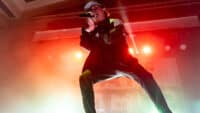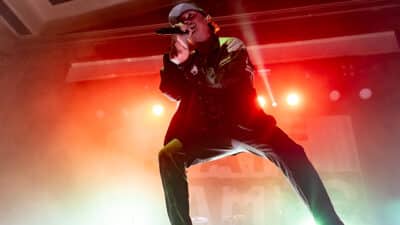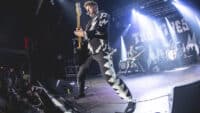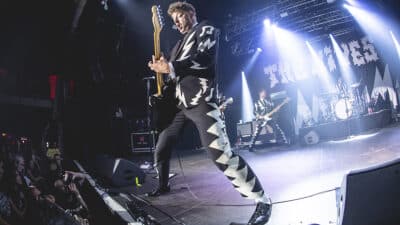Interview
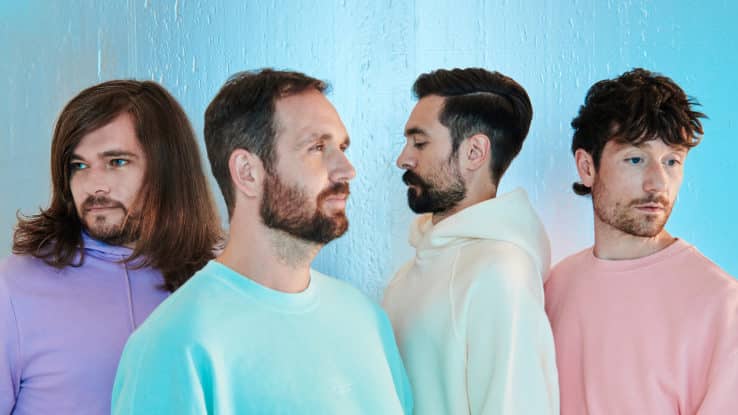
Interview
First Stages: Bastille
The UK pop giants on the metaverse, risky first dates and their rapid rise to the top
Forget Yashoda the Elephant or Paul the Octopus. Perhaps the real soothsayers of our times have been under our nose this whole time: Bastille. It must have felt oddly prophetic after having released an album in 2019 named Doom Days – set over the course of a house party while an apocalypse loomed outside – to then be shut inside just months later while doom certainly raged (though, ahem, not all of us were having parties).
It must have felt doubly bizarre, then, after conceptually building their fourth album during this time around the overlap between online life and reality, to hear Mark Zuckerberg announce plans for his metaverse in October 2021. Admittedly, that was also bizarre for everyone.
The band’s fourth studio album, Give Me The Future, built on their Brit Award-winning, towering electro-pop sound and provided a striking, sci-fi aesthetic for their arena-filling shows this summer. We spoke with bassist and guitarist Will, keyboardist Kyle and drummer Woody on the increasingly blurred line between online and reality and why some of the first stages to host Bastille are still so dearly cherished.
Your last album, Doom Days, explored real escapism, but on Give Me The Future you explore the opportunities for getting away online. I’m guessing it’s not a coincidence these two records sandwiched a pandemic, then?
Will: It’s funny, because the last one was about the hypothetical end of the world, and then the pandemic happened. I think with this new one we wanted to continue to explore escapism, but move more into the realm of science fiction and futurist ideas, but at the same time explore how the future and the present are blurred now. With the ‘metaverse’ and everything moving into VR, it’s a very interesting time, and the first time weirdly since I can remember where it does feel like all the things that were sci-fi when I was a child are now scarily real.
Woody: It’s the ultimate escapism really isn’t it, leaving reality altogether. I’ll give it to Dan, he does seem to be accidentally prophetic with what he writes about. Doom Days was quite an ominous album title given what followed, and now given that the metaverse is all in the news and people are getting more into crypto and NFTs and all manner of technological leaps forward. We’ve never really been a band to write bog standard love songs.
Kyle: We’ve been pushed further into the technology we’ve built for ourselves because we’ve been so disconnected in a literal sense. Even before lockdown, social media was so important for us and a lot of bands, because it’s a way to connect with fans, to ask and answer questions and get that personal touch. It still happens, but before you had to write fan mail, and you’d see videos of old bands next to a big pile of letters. We still do get that, but you can message someone online and get a reply in a minute; someone can message their favourite singer in the whole world and maybe get a reply within ten minutes, and you’re having that connection with them.
You’re going to get a new influx of DMs from fans now that you’ve said that.
Kyle: Oh god, yeah you’re right…
I don’t want to linger on the last three years for too long, but how did you make the most of the situation?
Woody: I would say that people had very different experiences. If like myself you had two small children, it was incredibly f**king trying – and that’s putting it mildly, haha. There’re some who had a lovely old time on furlough learning to bake banana bread and rearrange their house. I hate those people, I was slowly losing my mind, haha! But yeah, touring has been a way of life for us over the years, not just a job, so to have it taken away was just shattering.
Will: We were actually very fortunate in that we’d literally just finished touring, and got home just before it hit in the UK. We had just started to write the new album at that point; finding positives, it was a new way of doing things. I remember we recorded the bass to a bunch of the new songs in the first few weeks of the lockdown, so it really pushed us to think out of the box. We were all working at home and sending files over to our producer Mark, so it was a completely different way of doing things for us; in many ways it was preferable, because it gave me time to sit with the songs. Also it was quite in keeping with the concept, which is that we’re all together but apart and connected via technology, so to have to create the album that way out of necessity was a nice quirk.
Kyle: It gave a few of us the push to get a proper set up at home. I don’t even think Will had any music making software on his computer, haha, it’s insane. We all ended up making these janky vocal booths in our houses, sending ideas over. It was weird to do it like that, but interesting to see how easily it can be done. Also, we were able to work with people who might normally not have the time, but next thing you know we’re working with Graham Coxon on a track. When else would we be able to work with someone like that, do you know what I mean?
Let’s take it back to your memories of your first show. What constitutes your first show is a bit blurry here, as you’d been playing in various guises before your first ‘proper’ show as Bastille, right?
Kyle: Woody is the best at remembering, so I’d go with him.
Woody: Yeah, it was somewhere in Dartford. It was a warm up ahead of The Great Escape Festival, which was the first official one. But yeah we did an unannounced one in Dartford, I remember because Dan was so bad at parking that a local stopped and gave him two fingers for blocking the road.
Will: We’d done a few under some pseudonyms, I can’t remember any of them though. Originally it was me, Dan and Woody and we were just Dan Smith. Then we met Kyle and became Bastille at the end of 2010, and then did two or three tiny shows. The one I really remember was what I think might be the first show we played as Bastille was actually The Macbeth in East London. I remember it because it was actually where I met my wife, it was our first date. Killed two birds with one stone, haha. So yeah, it’s pretty nice that the beginnings of Bastille and meeting my wife are the same thing.
We’d got Kyle in quite recently at that point, and we had ‘Things We Lost In The Fire’ and ‘Laura Palmer’ in existence, but we hadn’t written ‘Pompeii’ or anything like that yet, and I remember it was this tiny stage. I think we had a couple of girls on the strings, because we used to play with Verity and Gemma who played on all of the first album, but there was a point where they were at every gig, until we realised that wasn’t always going to work. As a band when you’re coming up and doing the pub circuit, you feel like you want to get on to those bigger venues. Growing up in Northampton and Leamington Spa, there were some venues there that are quite dear to me, but I remember always wanting to go to London and play The Garage or Shepherd’s Bush Empire. So of course at the time it felt like it’s just another shit gig in a pub, but in hindsight those are the fun ones.
Does your wife remember the Macbeth show the same way that you do?
Will: Well, she thought I was a dickhead, ha! She’s told me that. She had to be convinced by friends of hers to go on a second date.
It is quite bold making your first date one of your first shows…
Will: Yeah. She’s not a party person generally and has refined tastes, shall we say? So it wasn’t the most inviting offer. She actually missed most of the show. I think she just made the end of the last song. I’d not even met her at this point, I’d just got her number off a friend, and so I remember she walked in as I was packing my bass away and I was like, there’s that girl.
Very well played from your wife. Not a doting fan, you can do better than that!
Will: I know, she’s only been to about three of our gigs. The joke in the band is that she’s way too cool and doesn’t like our music, haha.
Woody: She played it very, very cool haha.
Are there any venues from those very early days in particular you’d like to come back to and play at some point?
Will: As a band we’d really like to go back to Moles, in Bath, where we did a really memorable gig. I think it was the first time we realised we might have something going here, because it was the first time we’d heard people singing our songs. There’s a few venues like that, like The Macbeth, that have a special place in our hearts.
Kyle: That was great. People were singing it word-for-word, and this was still early doors. People were just hearing our stuff online, on Myspace I think. Moles is a basement, really low ceiling and the stage is shallow but long, so we were standing in a line, face-to-face with the audience. People aren’t just here to hear some music and we’re playing, people are here to listen to us because they know our songs.
Woody: It was on Halloween, and we had released ‘Flaws’, which had this video with girls in skeleton makeup, and half the crowd turned up looking like that and sang along. It felt like, you are doing the right thing, keep going, you know? It was a landmark for us. In Bastille land at least, Moles would be blue plaque worthy.
Is it fair to say Bastille experienced a pretty quick transition to success and popularity, and a change in the types of spaces you were playing? Did that feel more like a smooth transition or a rapid jump?
Will: In hindsight it was meteoric, but at the time it felt like the longest, most arduous slog ever, because you’re constantly terrified you’re not going to make it. But every time we’d play in London it would be a step up. We did the pub scene, and within a few weeks were doing slightly bigger venues, and then not long after we were doing Scala in North London, and then KOKO and then Shepherd’s Bush. Of course, having lived in London for years at this point, there’s certain venues that represent more than just the venue. They’re points in your career; so the first time we did Shepherd’s Bush Empire it was like, ‘oh we’re that kind of band’. Then we three nights Alexandra Palace, and then Brixton Academy and two nights at The O2 and it’s like, ‘So we’re here now’. So in hindsight it did happen quite quickly, but at the time it felt like it was taking forever, saying, ‘when are we gonna make it man!?’
Woody: Yeah it’s funny, that is the perception. But I’ve been playing with Will and Dan since 2008, so I feel like our journey started there. I know Bastille formed properly from 2010 onwards, but we’d done quite a few shows by then anyway. The grassroot venues are where people serve their apprenticeship: It’s where gear breaks down; things go wrong; you learn to interact with crowds and work a room. That sort of stuff. Not naming names, but I know a few acts who’ve been signed off the back of Soundcloud or what have you and their first gig ends up being Brixton Academy or something, airdropped into this rabbit-in-headlight situation. But we have been on a slow and steady incline, so you’re comfortable with the level you find yourself at, if that makes sense.
Kyle: Also, we were all in disbelief that we were being able to play shows at all! It wasn’t like we got used to playing X capacity gigs and then when we played bigger shows we started noticing the growth, because we were always gobsmacked that we were doing it at all and that people were listening and singing along. We weren’t super young, fresh out of uni or whatever. We’d all already done that and moved to London and were a bit older, so we were careful not to lean too far into that and get wrapped up in it. We were a bit more established as people as it all started to happen, so I think we’ve always been pretty good at keeping each other in check and not letting it get to your head.
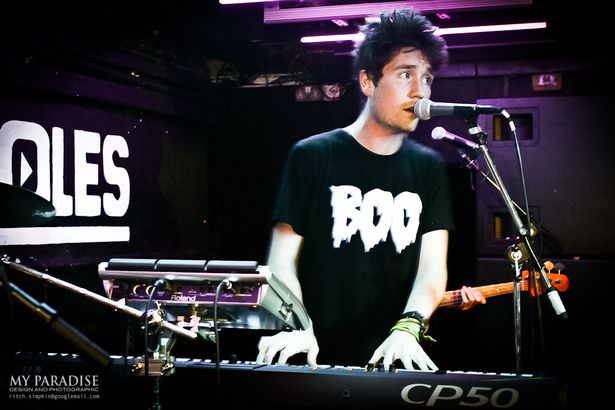
Of course when you released that first EP you were still driving yourself around the country with a DIY approach; how important do you think those days were to where you are now?
Will: Oh absolutely. There are people who, whether through a TV show or something, go from having never played a gig to Wembley. I think everyone else who’s been in a band has driven five hours in their mate’s car to play to a few people and I think that is formative. I always try and resist spouting out cliché after cliché, but Dan, Woody, Kyle and myself met twelve years ago now, and we did a couple years of that life, and it’s tough. Being in a car with all of your gear and four other people driving for hours and getting home at 4AM after playing to four people. Touring is a dream, but it’s also tiring and quite grueling at times, and I’ve spent nearly a third of my entire life with the same people in very close proximity for long periods of time. So I think those early days set you up and test the waters, if you like. I think you’d know early on if you weren’t going to get on with these three idiots. It’s like an apprenticeship.
Kyle: Definitely. For the first tour we borrowed a mate’s mum’s car, this seven-seater, so we could fit everything in there, and we slept on floors. At that stage, when we travelled out of London, the crowds were smaller and smaller, especially as sometimes they were just there not to see you but to go to their local boozer and there we are playing in the corner. There were a few shows like that on that tour that were tough, haha. But yeah, you realise that it’s doable. We know it’s doable because we’ve been within two metres of each other for two weeks, and so you realise you can keep it going.
Woody: You also have to grow up and mature a bit as well, and learn who has what buttons that can be pressed and which ones definitely should not be pressed.
And for all of your huge stages and big outdoor shows, you’ve still made efforts in recent years to play surprise or secret intimate shows. Why is it important for you as a band to return to that, and what do you think it adds to your experience?
Woody: It keeps you honest. At those sorts of venues, you can’t hide behind a wall of video screens or production tricks. You have to play a show and deliver, so it keeps you honest.
Kyle: We love doing it, and we continue to go back to little venues for the intimacy, you can’t match it. All the people that are there are hardcore fans, and being able to be that close to them is unifying. You’re all a lot closer on stage as well. Dan’s climbing over the stage and banging into keyboards because he can’t get anywhere, and it’s all a lot more rough-and-ready, which is something you lose as you gain more space. You know, your production grows in size with you, and all of a sudden I’ve got a cool station that I’m based in, but I’m also quite separate from everyone on stage.
WOODY: Everyone f**king hates me in small gigs, because all they hear are cymbals.
Will: It just adds energy. We’re so privileged to have played The O2 and Glastonbury and things like that, and there’s a certain feeling when you’re on a huge stage in front of a sea of people. It’s sort of an edifying feeling. But it’s very detached. I remember just before the pandemic actually we were in Australia, and we played a really small tour and some of the shows were pubs, we’re not huge over there. I just remember on the first night playing basically this pub gig, and three feet away were these faces who were just as enthusiastic as the ones at the front row of Glastonbury, only they’re right in your face. It’s louder, the drums are right behind you, it’s hot and sweaty. It really is a cliché saying, ‘that’s what it’s all about man’, but for me there’s an energy that’s so visceral and immediate that you do miss when you’re on a bigger stage. It’s collaborative: you’re much more with the audience. Maybe that sounds pretentious, but it’s more of a shared experience I think, because of the physical proximity.




